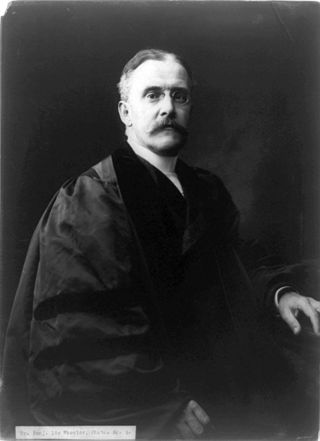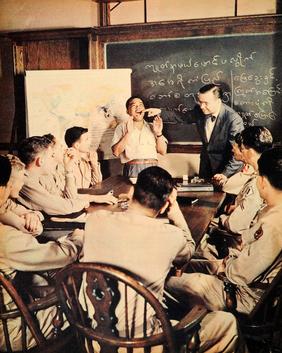Related Research Articles
Leonard Bloomfield was an American linguist who led the development of structural linguistics in the United States during the 1930s and the 1940s. He is considered to be the father of American distributionalism. His influential textbook Language, published in 1933, presented a comprehensive description of American structural linguistics. He made significant contributions to Indo-European historical linguistics, the description of Austronesian languages, and description of languages of the Algonquian family.
William Labov is an American linguist widely regarded as the founder of the discipline of variationist sociolinguistics. He has been described as "an enormously original and influential figure who has created much of the methodology" of sociolinguistics. He is a professor emeritus in the linguistics department of the University of Pennsylvania and pursues research in sociolinguistics, language change, and dialectology. He retired in 2015 but continues to publish research.

Morris Halle was a Latvian-born Jewish American linguist who was an Institute Professor, and later professor emeritus, of linguistics at the Massachusetts Institute of Technology. The father of "modern phonology", he was best known for his pioneering work in generative phonology, having written "On Accent and Juncture in English" in 1956 with Noam Chomsky and Fred Lukoff and The Sound Pattern of English in 1968 with Chomsky. He also co-authored the earliest theory of generative metrics.

Einar Ingvald Haugen was an American linguist, writer, and professor at University of Wisconsin–Madison and Harvard University.

Winfred Philip Lehmann was an American linguist who specialized in historical, Germanic, and Indo-European linguistics. He was for many years a professor and head of departments for linguistics at the University of Texas at Austin, and served as president of both the Linguistic Society of America and the Modern Language Association. Lehmann was also a pioneer in machine translation. He lectured a large number of future scholars at Austin, and was the author of several influential works on linguistics.

Benjamin Ide Wheeler was a professor of Greek and comparative philology at Cornell University, writer, and President of the University of California from 1899 to 1919.

Eric Pratt Hamp was an American linguist widely respected as a leading authority on Indo-European linguistics, with particular interests in Celtic languages and Albanian. Unlike many Indo-Europeanists, who work entirely on the basis of written materials, he conducted extensive fieldwork on lesser-known Indo-European languages and dialects, such as Albanian, Arbëresh and Arvanitika; Breton; Welsh; Irish; Resian and Scots Gaelic.
Bernard Bloch was an American linguist. He taught at Brown University and was Professor of Linguistics at Yale University.
Alan Strode Campbell Ross was a British academic specialising in linguistics. He is best remembered as the ultimate source and inspiration for author Nancy Mitford's "U and non-U" forms of behaviour and language usage as class indicators.
Hans Kurath was an American linguist of Austrian origin. He was full professor for English and Linguistics at the University of Michigan, Ann Arbor. The many varieties of regional English that he encountered during his trips convinced him of the necessity of completing a systematic study of American English.
Stefan Th. Gries is (full) professor of linguistics in the Department of Linguistics at the University of California, Santa Barbara (UCSB), Honorary Liebig-Professor of the Justus-Liebig-Universität Giessen, and since 1 April 2018 also Chair of English Linguistics at the Justus-Liebig-Universität Giessen.
The history of linguistics in the United States began to discover a greater understanding of humans and language. By trying to find a greater ‘parent language’ through similarities in different languages, a number of connections were discovered. Many contributors and new ideas helped shape the study of linguistics in the United States into what we know it as today. In the 1920s, linguistics focused on grammatical analysis and grammatical structure, especially of languages indigenous to North America, such as Chippewa, Apache, and more. In addition to scholars who have paved the way for linguistics in the United States, the Linguistic Society of America is a group that has contributed to the research of linguistics in America. The United States has long been known for its diverse collection of linguistic features and dialects that are spread across the country. In recent years, the study of linguistics in the United States has broadened to include nonstandard varieties of English speaking, such as Chicano English and African American English, as well as the question if language perpetuates inequalities.
Ward Hunt Goodenough II was an American anthropologist, who has made contributions to kinship studies, linguistic anthropology, cross-cultural studies, and cognitive anthropology.
Sheila Ellen Blumstein is professor emerita of cognitive, linguistic and psychological sciences at Brown University, where she was the Albert D. Mead Professor of Cognitive, Linguistic and Psychological Sciences. Among other distinctions, she served as the interim president of Brown University from February 2000 until July 2001 after Gordon Gee departed and before Ruth Simmons took the position. Although Dr. Simmons is deemed the first female president of the university, Dr. Blumstein's portrait hangs in Sayles Hall along with those of past presidents.

William Stewart Cornyn (1906–1971) was a Canadian-born American linguist and author, noted for his expertise in Burmese and Russian language studies, as well as for his research on Athabaskan and Burman etymology.
Lila Ruth Gleitman was an American professor of psychology and linguistics at the University of Pennsylvania. She was an internationally renowned expert on language acquisition and developmental psycholinguistics, focusing on children's learning of their first language. Gleitman's research interests included language acquisition, morphology and syntactic structure, psycholinguistics, syntax, and construction of the lexicon. Notable former students include Elissa Newport, Barbara Landau, and Susan Goldin-Meadow.
William Norman Brown was an American Indologist and Sanskritist who established the first academic department of South Asian Studies in North America and organized the American Oriental Society in 1926. He was the Professor of Sanskrit at the University of Pennsylvania for most of his academic career. He was president of the Association for Asian Studies in 1960. He is considered the founder of the field of South Asian Studies, which he pioneered in his career over four decades at the University of Pennsylvania, where he helped to found the Department of Oriental Studies (1931), and later single-handedly founded the Department of South Asia Regional Studies (1948). These departments are now survived by the departments of East Asian Languages and Civilizations, Near Eastern Languages and Civilizations, and South Asia Studies. W. Norman Brown also founded the American Institute of Indian Studies, which was located in the Van Pelt Library at the University of Pennsylvania.

W. Nelson Francis was an American author, linguist, and university professor. He served as a member of the faculties of Franklin & Marshall College and Brown University, where he specialized in English and corpus linguistics. He is known for his work compiling a text collection entitled the Brown University Standard Corpus of Present-Day American English, which he completed with Henry Kučera.
Anne Harper Charity Hudley is an American linguist who works on language variation in secondary schools. Since 2021, she has been a professor at the Stanford Graduate School of Education.
References
- ↑ Welmers, William Everett (1974). African Language Structures . University of California Press. p. 53.
- ↑ Archibald A. Hill, “William Freeman Twaddell,” Language 59, no. 2 (1983): 347–54.
- ↑ Reinhard Köhler; Gabriel Altmann; Rajmund G. Piotrowski (2005). Quantitative Linguistik / Quantitative Linguistics: Ein internationales Handbuch / An International Handbook. Walter de Gruyter. p. 151.
- ↑ Koerner, E.F.K. (1998). First Person Singular III: Autobiographies by North American scholars in the language sciences. John Benjamins Publishing. p. 90.
- ↑ "From Martha Mitchell's Encyclopedia Brunoniana" . Retrieved 7 June 2014.